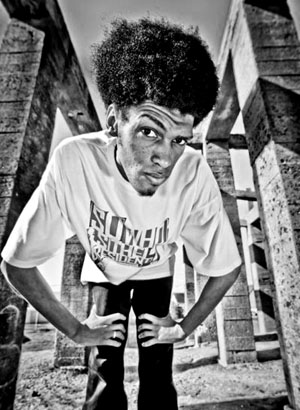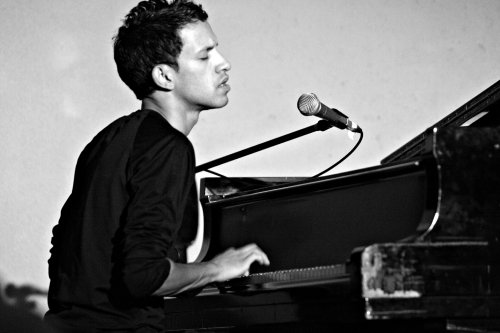Pan-African Space Station
The Anti-Art of Kongofuturism
In the multidisciplinary lifework of Bebson Elemba aka Bebson de la Rue, Eléonore Hellio* discovers the mind and matter that inspire ‘ephemeral architectures’, radical folklore and emancipation from the post-colonial present.
Bebson de la Rue is one of central Africa’s most unique sound and visual artists. A musician and a singer, a rapper, performer and bricoleur extraordinaire, he grew up in the city of Mbandaka, on the banks of the Congo River. Located astride the Equator in a region of dense tropical forest, under Belgian rule Mbandaka was known as Coquilhatville. There, in the late 19th century, extraordinary violence was visited on the bodies and the minds of men, women and children forced to collect rubber for the colonial overlord, King Leopold II.
In 1989, Bebson left Mbandaka for Kinshasa. There, he moved to Ngbaka, one of the city’s toughest neighbourhoods. Ngbaka is located near Kin’s largest market. Not so long ago, it was a pretty quarter, known for the river that runs through it. In recent years, it has become home to those hardest off – kulunas (gang members), shegues (street children), tshels (prostitutes), dealers and a few families trying, like Bebson’s, to make it no matter what. Open to any and all who need the space, the compound he calls home is a refuge for many, related and otherwise.
Deep into Funk, in the 1990s Bebson founded a dance troupe called Nous Sommes Courageux (We Are Courageous). In 1993, he met the musician Man Stone, who taught him the basics of ragamuffin and reggae. Together, they invented ORF (Original Ragamuffin Folklore), a genre of music rooted in a Mongo proverb that signifies ‘let us not move in the direction they tell us, but follow our own way’. In the late 1990s, Bebson founded Trionyx, the band for which he is best known, setting off on a path of experimentation and research steeped in multiple influences. Drawing on his knowledge of Mongo proverbs, metaphors and rhythms, and melding thesewith Zaïrian Rumba, a wild brand of ragamuffin, rap and hip hop influences, he developed a radically original style of music. In 1994, he founded Ghetto Kota Okola (Ghetto Enter Grow), a school open to all, where he shares with young people his philosophies of music, dance and art.

Bebson draws the colossal strength and the intense sensibilities of his art from multiple sources: history and its (after-)shocks, the traditions of his people, radio, television and a wide range of outside influences he actively seeks out. The result is work that crosscuts virtually every discipline of the arts. His, in fundamental ways, is a post- (and an inter-) disciplinary practice, close in spirit to those of Dada and Fluxus. Almost an anti-art, it doesn’t give a shit about categories, or the market, or the universality of art. It is festive and critical and socially engaged – a survival tactic and a state of mind determined to say and to sound and to show the psyche of the space(s) in which it manifests. Though he is kin to John Cage, Robert Filliou and Alan Kaprow, it is for Michael Jackson, whom he suspects had Mongo ancestors, and for his own many peeps that Bebson deploys his funkattitude, zipping through the ozone in his DYI spaceship, a cool machine that runs on Pacolami (Ngbaka moonshine). Down on earth, when time allows, he builds ephemeral architectures mirroring his vision of the universe.
It is in sound, first and foremost, that Bebson’s practice finds its soul. From his childhood, he calls up the shiver of leaves when caterpillars hatch, the song of this bird and that bird, the rumble of thunder, the click-click-click of rain, the murmur of wind. In Kinshasa, he samples a world of industrial heaves and hos: the sound of motors, hammers and shears, gunshots and firecrackers, blown speakers, TVs on the fritz, and pots and pans clanging.
This is an excerpt from the April 2013 edition of the Chronic.
To read the article in full, get a copy in our online shop (paper or PDF) or visit your nearest dealer.
*Translated by Dominique Malaquais.
Call For An Archive Of Afrosonics

The collective improvisations of black America – and their profound impact on poetry and sound – are near impossible to find in the annals of US academe. In fact, their absence is as stark as the control of archiving is white, writes Harmony Holiday. Since the 1950s, jazz music and the literary imagination have been inextricably linked, producing transcendent recordings and written work and many hybrids of the two – a new sonics, an antique Futurism – from Langston Hughes …
Reading Fred Ho: A Jazz Suite in the Key of Red

Gwen Ansell and Salim Washington celebrate the revolutionary life, language and hard-ass leadership of an unconventional saxophonist, composer and generous collaborator. Reading The Text Gwen Ansell Prelude: Home is where the violence is ‘Everything I create starts with the music… [and music]… like any conscious human activity, can be a force to change humanity, society and the world.’ Baritone saxophonist, composer, martial artist and revolutionary polymath Fred Ho (Fred Wei-han Houn) was born in Palo Alto, California in 1957 and …
Whycome Kamerun be Bass Central?

Lionel Manga explores the place of music in the social and cultural space of ‘this here country’ – a world of ambient, chronic poverty and the land of Manu Dibango. Night has taken over from day where the Wouri river makes its way out to sea. Thick miasma travels the streets, stinking in the heat. The city’s going beery-eyed: joy and bitters, if you can believe it. It’s back to normal – sort of – but February lingers on the …
Gospel Christian Porn Rap

Fucking with the puritanical social mores that pervade the world’s most religious country is the clear and conscious intent of Ghana’s popular and controversial hip-hop duo, the clever FOKN Bois, writes Nana Darkoa Sekyiamah. M3nsa and Wanlov the Kubolor are the FOKN Bois: controversial, unapologetic and boldly venturing into territories that other Ghanaian musicians stay well clear of. The duo met as college students in 1997, and Wanlov would “lie to M3nsa’s teachers that M3nsa was needed at the school administration block by staff, and we would run off to …
Stalking Thandiswa

by Clarissa Cummings I’m a sucker for intense relationships with people who have no fucking idea I even exist. Since the advent of online social holes like Twitter and Facebook, my phantom connections and passive-emotional steez have skyrocketed. And I’m not complaining. I’ve been enthralled in some of the most fulfilling 15 minutes of non-committal, pseudo relationships. All types of relationships. I’ve become a serial cyber best friend, lover, intellectual companion and enemy; all with strangers I meet scrolling through …
JitsVinger: practicing, not preaching

By Lindokuhle Nkosi Jitsvinger is concerned with matters of identity. Language. Land. Becoming. Being. He delves deep into the “who are you” and “why”. Through his lyrical, rhythmic fast-paces rhymes, he aims to do more that entertain. He enlightens. In stark comparison to the flashy, bling-culture of the hip hop of late, he wears his humility like a cloak. “People always wonder about how I made it. How I’m making a living of my art but they don’t know what …
Kyle Shepherd: the beauty of it, the danger of it

by Clarissa Cummings The creative artist loathes hyper-intellectualism. Rationalization tends to eradicate emotion. Surrendering passion becomes another way to pay the devil. But what if intellectualism is not of the artist’s personal doing, but instead of his surroundings, not by choice and inescapable? If in a provincial Cape Town home where the household language is colonial British and an appreciation for art, from Bach to Monk, an artist is born? How, if in this home lived a grandfather who every …
Transcendence at Tagore’s by Mia Arderne

Mia Arderne blogs through a “veil of cigarette smoke” on one night at Tagore’s where “You may die in obscurity here but never in silence.” Late on sultry nights in the lesser posh folds of Cape Town, Bohemia sounds her siren through the maze of Obs. From the pores of the city, jazz addicts crawl out and filter into a warm sound-saturated room. A blues note drops into your ashtray before you’ve lit your smoke. A curtain of suits, hoodies …